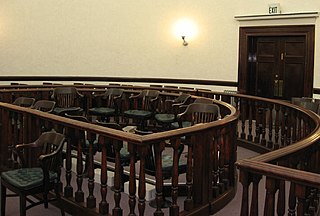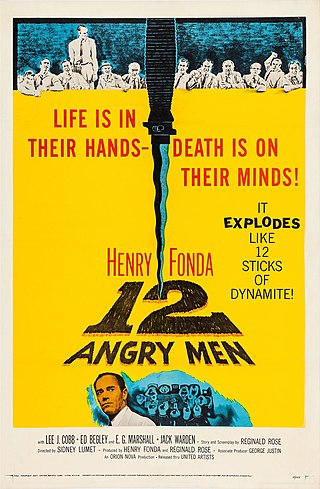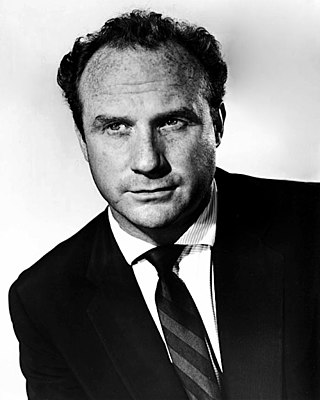Related Research Articles

A jury trial, or trial by jury, is a legal proceeding in which a jury makes a decision or findings of fact. It is distinguished from a bench trial in which a judge or panel of judges makes all decisions.

A jury is a sworn body of people (jurors) convened to hear evidence, make findings of fact, and render an impartial verdict officially submitted to them by a court, or to set a penalty or judgment.

12 Angry Men is a 1957 American legal drama film directed by Sidney Lumet, adapted from a 1954 teleplay of the same name by Reginald Rose. The film tells the story of a jury of 12 men as they deliberate the conviction or acquittal of a teenager charged with murder on the basis of reasonable doubt; disagreement and conflict among them force the jurors to question their morals and values. It stars Henry Fonda, Lee J. Cobb, Ed Begley, E. G. Marshall, and Jack Warden.
Jury nullification (US/UK), jury equity (UK), or a perverse verdict (UK) occurs when the jury in a criminal trial gives a not guilty verdict regardless of whether they believe a defendant has broken the law. The jury's reasons may include the belief that the law itself is unjust, that the prosecutor has misapplied the law in the defendant's case, that the punishment for breaking the law is too harsh, or general frustrations with the criminal justice system. Some juries have also refused to convict due to their own prejudices in favor of the defendant. Such verdicts are possible because a jury has an absolute right to return any verdict it chooses.

In law, a verdict is the formal finding of fact made by a jury on matters or questions submitted to the jury by a judge. In a bench trial, the judge's decision near the end of the trial is simply referred to as a finding. In England and Wales, a coroner's findings used to be called verdicts but are, since 2009, called conclusions.

Jack Warden was an American character actor of film and television. He was nominated for the Academy Award for Best Supporting Actor for Shampoo (1975) and Heaven Can Wait (1978). He received a BAFTA nomination for Shampoo, and won an Emmy for his performance in Brian's Song (1971).
A hung jury, also called a deadlocked jury, is a judicial jury that cannot agree upon a verdict after extended deliberation and is unable to reach the required unanimity or supermajority. A hung jury may result in the case being tried again.
Not proven is a verdict available to a court of law in Scotland. Under Scots law, a criminal trial may end in one of three verdicts, one of conviction ("guilty") and two of acquittal.

Cecil Yekuthial Linder was a Polish-born Canadian film and television actor. He was Jewish and managed to escape Poland before the Holocaust. In the 1950s and 1960s, he worked extensively in the United Kingdom, often playing Canadian and American characters in various films and television programmes.
Steven Murray Truscott is a Canadian man who, at age fourteen, was convicted and sentenced to death in 1959 for the rape and murder of classmate Lynne Harper. Truscott had been the last known person to see her alive. He was scheduled to be hanged; however, the federal cabinet reprieved him and he was sentenced to life in prison and released on parole in 1969. Five decades later, in 2007, his conviction was overturned on the basis that key forensic evidence was weaker than had been portrayed at trial, and key evidence in favor of Truscott was concealed from his defense team. He was the youngest person in Canada to face execution.
A new trial or retrial is a recurrence of a court case. A new trial may potentially be ordered for some or all of the matters at issue in the original trial. Depending upon the rules of the jurisdiction and the decision of the court that ordered the new trial, a new trial may occur if:

The Lineup is an American police drama which aired on CBS radio from 1950 to 1953 and on CBS television from 1954 to 1960.

Twelve Angry Men is a play by Reginald Rose adapted from his 1954 teleplay of the same title for the CBS Studio One anthology television series. Staged first in San Francisco in 1955, the Broadway debut came 50 years after CBS aired the play, on October 28, 2004, by the Roundabout Theatre Company at the American Airlines Theatre, where it ran for 328 performances.

Wilbert McClure was an American boxer. As an amateur he won gold medals in the light middleweight division at the 1959 Pan American Games and the 1960 Olympics. As a professional he competed from 1961 to 1970.

The Court of Bosnia and Herzegovina is the highest ordinary court of Bosnia and Herzegovina. It was established on 3 July 2002 by the Parliament of Bosnia and Herzegovina with the Law on the Court of BiH, promulgated on 12 November 2000 by the High Representative for Bosnia and Herzegovina.

Martin Benjamin Benson was a British character actor who appeared in films, theatre and television. He appeared in both British and Hollywood productions.
One of a Kind is a Canadian television panel game show which aired on CBC Television from 1958 to 1959.
"Guilty" is the 14th episode of the fourth season of the American television drama series Person of Interest. It is the 82nd overall episode of the series and is written by co-executive producer David Slack and directed by Kate Woods. It aired on CBS in the United States and on CTV in Canada on February 10, 2015.
References
- ↑ Corcelli, John (February 2005). "Guilty Or Not Guilty". Canadian Communications Foundation. Retrieved 7 May 2010.